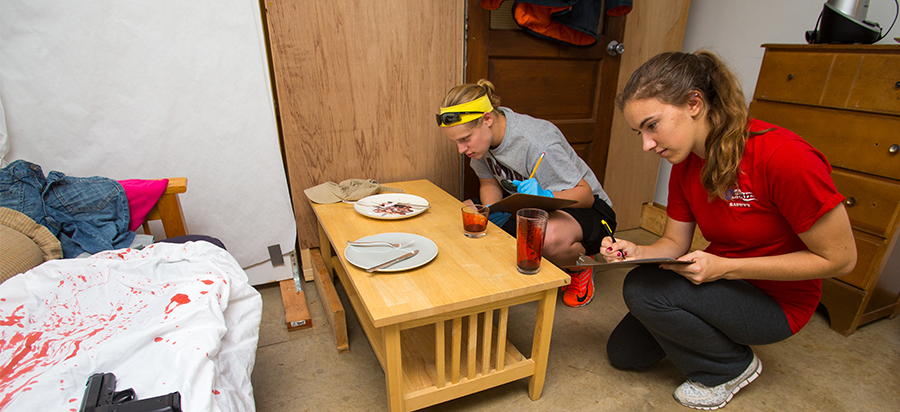Labs and Facilities
Forensic Investigation Crime Scene House
As part of its continuing efforts to provide the leading forensic investigation education and training, the University of Wisconsin-Platteville has developed the Forensic Investigation Crime Scene House (FICSH). The facility is located only a short drive from campus at the Pioneer Farm, which provides easy access for students and faculty.
The forensic investigation house is arranged as a residential structure with the basement designed for classroom instruction, while still having the look and feel of a commercial structure. The entire first floor, basement area, and exterior of the house are wired with closed circuit digital video equipment that can be recorded and monitored, which gives instructors a unique method for critique. There are two one-way mirrors on the first floor that can be used for non-intrusive observation of training, such as simulated interrogations.
UW-Platteville firmly believes that students learn best through the hands-on application of principles taught in the classroom. The forensic investigation house gives students the opportunity to experience what crime scene personnel experience when arriving at the scene of a crime. They are taught important principles including entry procedures, photography, evidence documentation and collection, latent fingerprint development techniques, bloodstain pattern analysis, and many other aspects of forensic investigation. By providing a first-hand look at the procedures followed by crime scene personnel, our faculty can better illustrate the concepts of corresponding lectures.
Forensic Investigation Research Facility
In addition to the house, the property on which the house rests is home to the Forensic Investigation Research Facility. This property contains approximately 1.5 acres of fenced land upon which students are able to conduct mock crime scene practicals, including search methods, clandestine gravesite excavation, and expanded/multiple scenario training. The first of its kind in the Northern United States, the facility allows criminal justice faculty and students to conduct ongoing research into the specific climate related effects on body decomposition.
Forensic Investigation Lab
Modifications to a traditional classroom have been made in order to house the new Forensic Investigation Laboratory. The laboratory location has a full wall of glass windows, which enables visitors to observe students, faculty, and staff working in the lab without interference. Laboratory-grade countertops, cabinetry, and a sink have been installed, as well as ventilation and lab equipment hoods to assure the safety of the room. Equipment in the lab includes Automated Fingerprint Identification System (AFIS) terminals, down flow work stations with fuming hoods, fuming chambers, swab drying chambers, comparison microscopes, and an instructor's station connected to a digital projection unit. The lab also has a designated lecture space that is reserved for forensic investigation classes and will accommodate approximately 40 students. As a result of this set-up, instructors are able to quickly transform from lecture materials directly into hands-on activities.
